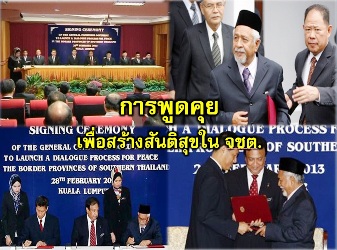A roadmap for peace that all stakeholders are involved?
During the weekly address to the Thai people in the "Bringing Happiness to the People" programme on August 15,

National Council for Peace and Order chief General Prayuth Chan-ocha said, at one point, about the peace talks with the separatist gangs in the Deep South, that the Thai side had been coordinating with Malaysia in its capacity as the facilitator about Thailand’s determination to carry on with the talks.
Three days afterward, the Region 4 of the Internal Security Operations Command staged a public forum at Park View hotel in Pattani to gauge public’s views about the peace talks which has been suspended for almost a year now.
Originally, the forum was supposed to be limited to the media and Lt-Gen Walit Rojanapakdee, the commander of the Fourth Army Region. Later on the format of the forum was changed to be more open and with more participants.
But the highlight of the day was a lecture by Colonel Vicharn Sookslong, deputy chief of staff of the Fourth Army Region on the roadmap to bring about peace to the southern region.
The colonel began the talk by stressing the importance of keeping alive the peace talks for four reasons: no conflict can be resolved with violence; peace talks are universally recognized and accepted; peace talks are demanded by the international community and the Thai public; and southern unrest will not bode well for Thailand as the Asian Economic Cooperation is nearing.
Before 2012, there have been ten rounds of secret informal talks mostly get-togethers to familiarize one another to earn mutual trust although the overall result was not impressive.
Then during 2012-13, fugitive former prime minister Thaksin Shinawatra entered the picture when he met Hassan Taib (who later became chief of the negotiating team of the Barisan Revolusi Nasionale) at a hotel in Kuala Lumpur.
Policy wise, the government formulated a policy for the administration and development of southern border provinces which specifies clearly the need to create an environment that is conducive to peace talks in search of solution to the conflict.
On February 28,2013, the Thai government and the BRN signed a document paving the way for the start of the peace talk process. Throughout the year 2013, there were seven rounds of talks – three formal and four informal – between the two sides.
Unfortunately, the talks bogged down since then. Four reasons have been cited for the failure of the talks: lack of mutual trust; there was no framework of the talks that both sides must follow; the BRN was forced to enter the peace talks process by Malaysia; and the Thai side was not ready for the talks as they lack a clearcut framework and strategy for talks.
Nevertheless, the talks are a positive sign that there were attempts to search for a peaceful solution to the conflict and the Thai side was better informed about the movements of the separatist groups in the restive region and knew about the obstacles of the talks.
Beginning this year, the Internal Security Operations Command has emerged as the lead organization for talks with the separatist groups. A team has been set up with ISOC deputy director as the chief negotiator and a strategy for peace talks has been formulated with Malaysia still recognized as the facilitator.
The objective of the strategy is to build a mechanism and system that drives the peace process towards the same direction by all agencies involved and mutually supportive of one another, create unity and to build an atmosphere which is conducive to talks. More importantly, there is now a roadmap for the restoration of peace in the region – a roadmap that all stakeholders have a role to play.
